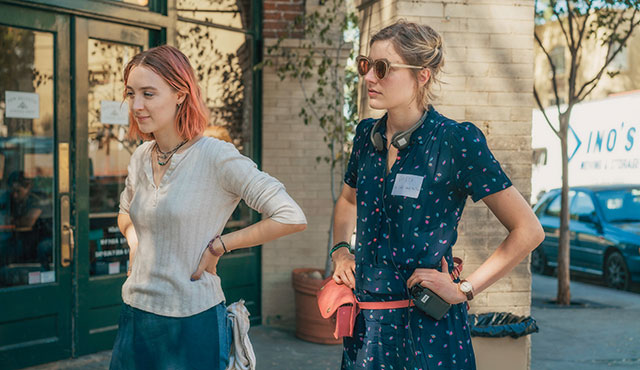Greta Gerwig’s new film, Lady Bird, has taken the critics by storm. It is the most-reviewed movie in the history of the website Rotten Tomatoes to have sustained a 100% positive rating, and it is receiving serious Oscar buzz for Best Picture, Best Director, and Best Actress. Having seen the coming attractions, I knew it would be a quirky, offbeat comedy, but I had no idea that Lady Bird would be of considerable religious interest as well.
The dramedy centers around the unusually complex relationship between Christine (who calls herself “Lady Bird”) and her mother Marion. The film opens with the two of them crying in the front seat of their car, having just finished listening together to The Grapes of Wrath. It’s obvious that they share a powerful emotional bond. But within seconds of that touching moment, they are arguing so violently that Lady Bird (in the most memorable sight-gag of the movie) simply opens the door and exits the moving vehicle!
Lady Bird is a bright and talented kid, but she passes through all of the typical teenage crises. Her first serious boyfriend turns out to be gay. Her follow-up relationship is with a pretentious and self-absorbed young man who basically uses her. She has a terrible falling out with her oldest girlfriend, who sincerely cares for Lady Bird, and she takes up with a superficial “cool kid” girl whom she tries desperately to impress, to no avail. Though she regularly bad-mouths her hometown of Sacramento, California as hopelessly provincial, it is obvious that she loves the place. She wants to go to a university far away, ideally on the east coast, but she realizes her grades are probably not strong enough, and her family doesn’t have the means to pay her way. All of this, of course, is a formula for considerable angst.
And Marion is essentially a good woman who sincerely loves Lady Bird, but she is also hovering, over-protective, hyper-demanding, and guilt-inducing. When Marion discovers that Lady Bird has kept secret the fact that she was accepted to an east-coast university, she responds in cold anger, giving her daughter the silent treatment, refusing even to say goodbye to Lady Bird as she leaves for college.
Now you might say, “okay, a typical coming of age story.” Yet running underneath this complex story of love and conflict is religion, more precisely, Catholicism. Though not a Catholic herself, Lady Bird attends a Catholic high school, with quite a number of priests and nuns on the faculty. At regular intervals in the film, we see Lady Bird and her classmates attending Mass and other religious services—and none of this is presented mockingly or ironically, as we’ve come to expect from most Hollywood productions. When Lady Bird auditions for the school’s fall musical, she discovers that an older priest is one of the drama coaches. This figure is presented very sympathetically as a man who, earlier in life, had been married and had lost a son, and who now wrestles with depression. When he goes away for treatment, he is replaced by a younger priest, who had served up to that point as football coach and who, to the amusement of his students, brings a good deal of fifty-yard-line enthusiasm to his new task.
But by far the most powerful and positive personages in the film are the religious sisters who staff the high school. To a person, they are bright, dedicated, funny, and wise, and provide strong role models for Lady Bird and her classmates. When one of the girls fixes a sign to the sisters’ car announcing, “married to Jesus for forty years,” the nuns privately enjoy the joke as much as the students. The pivotal scene in the film involves a conversation between the headmaster of the school and Lady Bird in the wake of Lady Bird’s truly insulting and objectionable behavior during an assembly. Whereas a more small-minded administrator would simply have dismissed the girl, this canny nun punishes Lady Bird but then invites her to explore her creativity as a writer. Throughout the film, the Catholic Church is an encouraging and illuminating presence.
And the spiritual payoff comes at the end of the story. Lady Bird arrives in New York, still alienated from her mother, still brooding and unhappy. She drinks too much at a party and finds herself in the hospital. In the bed next to her in the emergency room is a very young boy, his eye bandaged, sitting next to his mother who gives him comfort. It triggers something in Lady Bird. Wandering away from the hospital, she realizes that it is Sunday morning, and she enters a church, where she listens to the dulcet tones of a choir singing the praises of God. Moved to tears, she commences to recall the religious services, the priests, and the nuns who had shaped her. She then leaves a message of apology on her mother’s cell phone.
In a remarkable interview following the release of Lady Bird, Gerwig spoke of her own formation in a Catholic high school and of the priests and nuns who inspired her to realize that there is no single path to holiness, that God can use “whatever you’ve got.” She furthermore admitted that she often mused on what the saints were like as teenagers, before they had their lives together, before they found their path. What, she wondered, was the moment of grace that galvanized them and gave them direction? Lady Bird is precisely about that strange and surprising breakthrough of grace.
Bishop Robert Barron is an auxiliary bishop of the Archdiocese of Los Angeles and the founder of Word on Fire Catholic Ministries.

